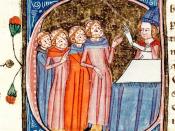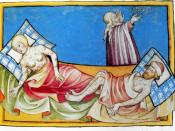What in your view were the most important effects that the plague had on later medieval European society?
"...The Black Death of 1348...casused an effect on all facets of life...was probably the most important event of fourteenth-century history..."
Yves Renouard
"...Ministers and executors...were either dead or sick or else felt so destitute...that they were unable to exercise any office..."
Giovanni Boccaccio
The Plague is often referred to as the single most important event in Medieval European history. The Black Death to this day is regarded one of the most dangerous viruses known to man. Possessing tremendous virulence, extreme vitality and speed, it spread like wildfire across Europe. Between 1347-1350, 25 million people had perished - one third of the entire European Population. We know from contemporary accounts that the progress of the disease was absolutely horrendous - families were split, "fathers left sons," "entire households were split," according to Yves Renouard in "La Peste Noire de 1348-50."
European society had "disintegrated morally, politically and spiritually,"says James Westfall Thompson in "The Aftermath of the Black Death and the Aftermath of the Great War," as the case would be during any crisis of this magnitude. However the natural course of events would inevitably bring on a rebirth. A rebirth of values, morals, art, opinion and humanity in general. The outcome of the Black Death is no exception - The Early Renaissance was on the horizon. From disarray a path showed. Europe was about to be transformed, moving away from its feudal roots.
One of the most important effects that played a role on later Medieval society was the astronomical death rate - 25 million dead - of all religions, position, orientations, classes and nationalities. The immediate effect must first be examined however, in order to see it in the long term...


